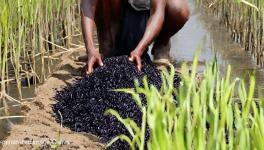UP: High Demand, Good Returns, but Where do Farmers Sell Chandauli’s Black Rice, Mr PM?
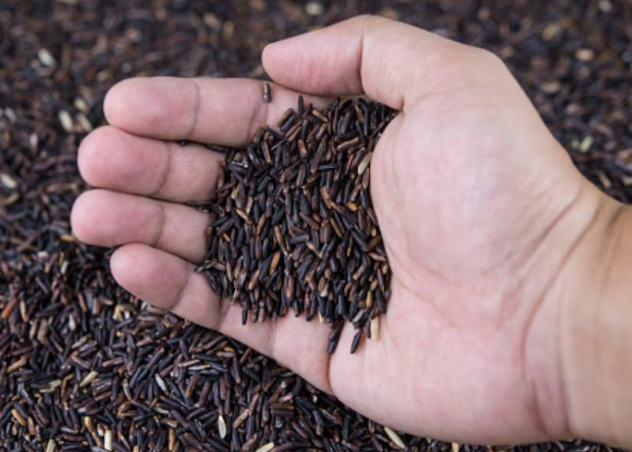
Chandauli (UP): Eleven-year-old Pooja, wearing a blue top that is torn in places, walks barefoot with her brothers (seven-year-old Anil and five-year-old Ajit) on a sharp pebble path, leading to the mountainous village of Pandi at Naugarh tehsil in Uttar Pradesh’s Chandauli district.
Pooja does not go to school, though there is a government school in her village till fifth standard, where the teachers allegedly rarely come. Her father — Rajesh Kharwar — is a small farmer and is unable to bear the expenses of sending her to a private school.
Kharwar has five bighas of land, which produces only one crop (paddy) in a year. For growing that, he has to depend on monsoon rains.
Pooja’s mother, Hoshila Devi, says they have eight cows and buffaloes in addition to the farm land. Those are the assets that the family owns.
Pandi village has a population of about 100 or 125 people. This remote and ignored village lacks basic facilities provided by the government.
Most of the children in the village have not ever seen trains or buses. Living in the forests, working in the fields, climbing and descending rocky terrain daily, and making friends with cows and buffaloes — this is how they spend their time.
For most parents, taking children along with them and engaging them in farm and cattle rearing activities is not a choice, but a compulsion.
“We cannot leave our children alone at home because of the fear of wild animals. Our village is surrounded on three sides by hills, which have thick forest cover — hosting bears, wolves, tigers and cheetahs. Therefore, our children always accompany us when we go out,” Devi told NewsClick.
Working in the fields amid intermittent rains, both Kharwar and Devi are busy preparing for paddy cultivation. “Apart from paddy, nothing grows here. Farm land in this district receives water from the Karamnasa river for irrigation, but we get water from river Sarpini that passes through our village. We wholly depend on rains for cultivation, as we cannot afford other means of irrigation,” she said.
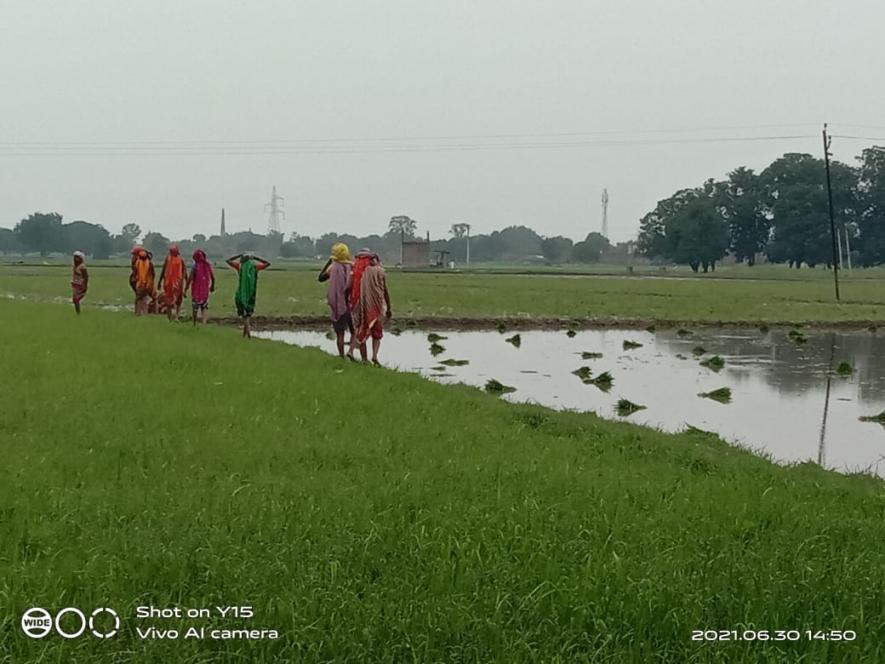
Karamnasa is a tributary of the Ganges. It originates in Bihar’s Kaimur district and flows through Sonbhadra, Chandauli, Varanasi and Ghazipur districts of Uttar Pradesh. Sarpini is the largest tributary of Jam river, which originates in Betul district of Madhya Pradesh and flows through several villages and towns during its short run, before ultimately draining itself off in Kanhan river.
Two years ago, in the hope of good returns, the village had opted for growing black rice, but the crop failed. Now, people here grow three varieties of paddy — Samba, Masuri and Sonam.
But, it is not just the failure of black rice crop that has disappointed the villagers, who are more upset with the lack of any government support.
“It’s not that we suffered losses because of the failure of black rice crop. Growing other varieties of paddy is also not beneficial. Growing any variety of paddy is leading us to desperation. We neither get bank loans nor any other government support for farming. We are forced to go to money lenders for monetary support. We have been left at the mercy of God,” said Kharwar.
Intensive paddy production is considered a good sign for economy, but Chandauli district — also called the rice bowl of Uttar Pradesh — has no proper arrangement for its storage and procurement. When the Prime Minister Narendra Modi-led government set a highly ambitious target of doubling farmers’ income by 2022, paddy growers in Chandauli said they borrowed huge sums from local money lenders and began cultivating black rice on a larger scale.
The harvest was good, but the absence of a market to sell the yield was a big problem. Those who cultivated black rice last year said their produce has not been sold till date. As a result, they are under heavy debt burden.
Black rice, also called ‘black gold’, is a rare and a very old variety of rice that has been grown in India for centuries. But it is cultivated in relatively small amounts, compared with other rice varieties. It is mainly grown in the North East and South India.
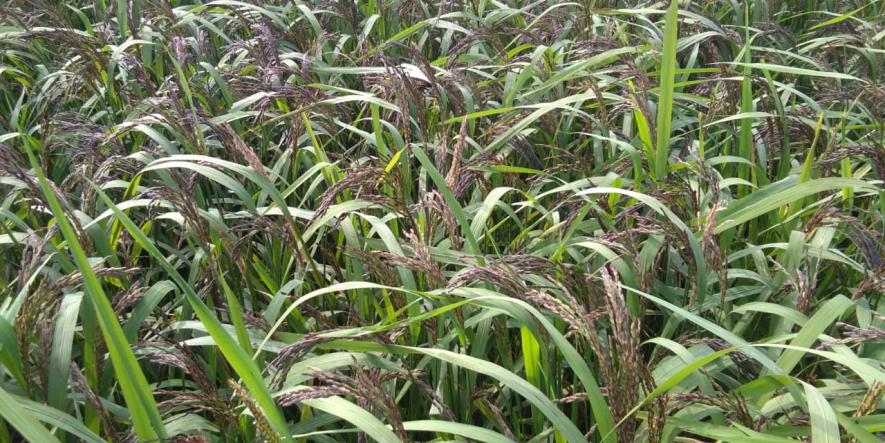
It is said to have several health benefits and is said to be rich in anti-oxidants. It is considered beneficial for those suffering from diabetes and hypertension. Since it is cultivated only with the help of organic manure, its production cost is lower than other rice varieties.
Chandauli District Agriculture Officer Rajeev Kumar Gautam told NewsClick over the phone that black rice contains a compound called ‘anthocyanin’, which gives it black colour. He claimed it has anti-inflammatory and anti-cancer properties. It also contains ‘carotenoids’, which are considered very good for eye health, he added.
In addition, Gautam said black rice was gluten-free and rich in proteins, iron, vitamin E, calcium, magnesium, natural fibre etc.
HIGH DEMAND, BUT NO MARKET
Also known as “superfood” because of various health benefits, black rice is among the most sought after varieties of rice in the market. It is exported to countries such as the United States, the United Kingdom, Australia and New Zealand.
In the absence of systematic procurement facility and storage, farmers are in distress and feel disillusioned with the cultivation of black rice.
Rajnarayan Kushwaha, a farmer from Jalalpur, said: “Despite high demand in the market, the cultivation of black rice is not helping our situation. We continue to be pushed to the wall. We neither get loans nor other government facilities. We are compelled to go to local moneylenders to meet input costs. We feel completely been abandoned.”
Jharkhande Singh, a farmer from Pritampur, said: “Growing black rice is not that easy. It is completely organic and labour-intensive. If the crop is sold, there is an exponential growth in farmers’ return compared with conventional rice cultivation. The price of black rice paddy is around Rs 80-85/kg, which is over four times the Grade A paddy MSP of Rs 19.6/kg.”
The price of processed black rice is Rs 160/kg, which goes up to Rs 200-500/kg. This makes black rice cultivation a lucrative proposition. But the key hurdle is marketing the produce.
“Despite good returns, farmers of Chandauli are facing problems in selling black rice as the region has not got GI (Geographical Indication) tag for the crop. The GI tag for black rice was given to Manipur last year,” said Singh, adding due to it being expensive, its local consumption is almost negligible. Therefore, there are no buyers in the local market.
Apart from Chandauli, black rice is also grown in UP’s other districts like Ghazipur, Sonbhadra, Mirzapur, Ballia, Mau and Azamgarh. But what are missing are buyers? When asked, government representatives choose to remain silent.
FARMERS IN LIMBO
Ratan Singh, a resident of Chandauli’s Siktha village, says has been growing black rice for the past four years, but could manage to sell the yield only once, that too at “throwaway” prices. Around 8,000 quintals of black paddy, according to him, are lying in farmers’ homes to be sold.
Visiting his parliamentary constituency, Varanasi, last year on the occasion of Dev-Diwali, Prime Minister Modi had showered praise on Chandauli farmers for their efforts in producing black rice. He had even claimed that farmers were earning three times their input cost. Black rice, he had said, has opened a big aisle to prosperity. However, Singh said all these claims were false.
“We never got more than Rs 8,500 per quintal (Rs 85 per kg). Some farmers even had to sell their produce at the rate of Rs 3,500 to 7,000 per quintal. After a lot of struggle, in 2020, about 600 quintals of black rice was sold in New Zealand, Australia, Qatar, and to ITC, Chaupal Sagar, Organic Haat and Organic Market Mumbai through Sukhbir Agro Company. We are hopeful that the government will either procure the produce directly from us or make some arrangement so that we can sell our crops. Let’s see when this hope is fulfilled and for how long we remain trapped in the quagmire of debt of moneylenders,” he added.
The farmers in the district also formed the Chandauli Black Rice Krishak Samiti, but it did not yield any effective result. Big farmers are selling some of their produce, but small farmers are unable to do so.
SHATTERED HOPES
Amarnath, who has been cultivating black rice for the past two years, says he borrowed from a private money lender by mortgaging a large part of his farm land and also took a loan from a public sector bank last year. He was hoping to pay back the borrowed sum and get back the mortgaged land by selling the crop, but that has not worked out yet.
The yield last year was good, but he says he is still waiting for buyers to procure the produce, which is stuffed in sacks and kept in his house.
“The incompetence of the district administration has led to the verge of destruction. This bitter experience has forced us to do away with the cultivation of black rice,” he added.
Virendra Singh, general secretary of the Black Rice Krishak Samiti, also feels hurt by the government’s attitude. He said farmers had stopped growing black rice because of the “incompetence” of the district collector. “The promise of doubling farmers’ income has also turned out to be a jumla,” he said.
“Most of the farmers of Chandauli have stopped cultivating black rice because of government apathy. They have even destroyed its seeds. This crop needs fertile land and organic methods of cultivation. It also requires a lot of labour,” he added.
Singh alleged that a Noida-based company, in collaboration with the government, committed a big fraud with farmers of the region by striking a deal with farmers of Chandauli to cultivate black rice on a large scale, most of which now lies unsold.
“The plants were surveyed and samples of the final produce were also collected. But when it came to buying the crop from farmers, the firm disappeared,” he alleged, adding that even the state government’s agriculture department did not come to their rescue.
“We are now growing other variety of rice,” he added.
Balwant Singh, a young farmer of Kanta Jalalpur, has been cultivating black paddy since 2018. His initial experience was good, but there were no buyers in 2019 and 2020, he said.
“There is no market across the country where black rice growers can sell their produce. The government encourages us to produce black rice, but when it comes to procuring the yield, it does not offer any solution,” he said.
‘ALL IS WELL’
Chandauli’s district magistrate could not be reached for comments despite repeated attempts. But a senior official of the district administration claimed export of the black rice was a “huge success” due to high demand and good profit margin in global markets.
“Black rice produced in and around Chandauli is being exported to countries such as Australia, New Zealand and Oman. The exports take place under the supervision of the Agricultural and Processed Food Products Export Development Authority (APEDA). The move witnessed a boost after the product was branded and marketed in the neighbouring district of Mirzapur as ‘Vindhya black rice’,” he told NewsClick over phone on condition of anonymity.
Rubbishing the claim that farmers have stopped production of black rice because of the unavailability of a market to sell, he went on to claim that cultivation has been promoted under various schemes of the Yogi Adityanath government, such as ‘Export Policy 2020-25’ and ‘One District-One Product’.
Year No. of farmers Area (in hectares) Production (in quintals)
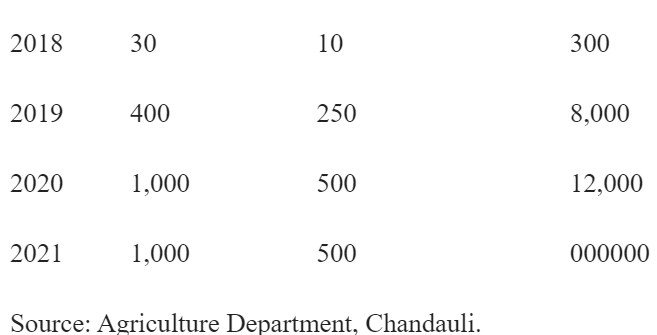
Which brings us back to the question: If cultivation is growing (as per the table above), where are the buyers? Why are farmers facing mounting debts and feeling short-changed? What about farmers claims of unsold stocks?
Get the latest reports & analysis with people's perspective on Protests, movements & deep analytical videos, discussions of the current affairs in your Telegram app. Subscribe to NewsClick's Telegram channel & get Real-Time updates on stories, as they get published on our website.









